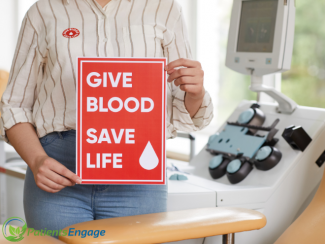
Donate Blood. Save Lives.
Can you donate blood or platelets? How should you prepare before a blood or platelet donation and what care do you need after a blood donation. All in one place. Dr. Shital Patel explains.
Eligibilities for Blood Donation
- Must be currently in good health with no active infection.
- Donor must be between 18-60 years of age.
- Donor must be no less than 45 kgs in body weight.
- Donor’s haemoglobin level must be no less than 12.5g/dl for females and 13.0g/dl for males.
- Donor's pulse rate must be between 50 to 100 beats per minute without any irregularities.
- Donor's blood pressure should be diastolic 50-100 mm Hg and systolic 100 to 180 mm Hg.
- A donor can again donate blood after 3 months of your last donation of blood.
- Body temperature should be normal and oral temperature should not exceed 37.5°C or 99.5°F.
- Eligibility for platelet donation is same as blood with one addition that donor's count should be no less than 1.5 lakhs/ml
Non-Eligibilities
- Donor should not be suffering from any active transmittable diseases such as a cold, stomach infection, STD, hepatitis, TB etc.
- Donor should not have any heart diseases, hypertension, kidney aliments, epilepsy, asthma, thalassemia, sickle cell, polycythemia vera or bleeding disorders or any kind of cancer.
- For persons with diabetes, blood donation may be allowed if the diabetes is under control with oral medications. People on insulin are not permitted to donate blood.
- Taken any antibiotics or aspirin in the last 48 hours.
- People who are on certain medications such as steroids, blood thinners, growth hormones, teratogenic drugs, retinoids, antiandrogens, immunosuppressants and experimental drugs used in clinical trials.
- Women who are currently menstruating, pregnant or breastfeeding. The specific time criteria may vary from state to state.
- Ladies with a heavy miscarriage should avoid donating blood for the next 6 months.
- If the donor has already donated blood or been treated for malaria within the last three months.
- If donor has undergone any immunization within the past one month.
- If donor has consumed alcohol within the last 24 hours.
- If you are HIV positive.
- If donor has engaged in any high risk activity (sexual or use of recreational drugs) that may lead to infectious diseases including STDs.
- If donor had a minor dental procedure, wait for 24 hours, in case of major dental work, wait for a month.
- If donor had any major surgery or head injury in the last 6 months
- If donor has got a tattoo, body piercing, or acupuncture in the last 6 months.
Pre Donation Care
- Drink plenty of fluids the night before and day of the donation.
- Avoid donating blood on an empty stomach. Eat three hours before you donate blood. Avoid fatty foods. Eat foods which are rich in iron such as whole grains, fish, eggs, red meat, spinach, leafy vegetables etc.
- Don’t consume alcohol or caffeine beverages before donating blood.
- If you are donating platelets, avoid fried /fatty foods 48 hours before donation.
- Carry a list of all the medications you are taking to know if you are eligible.
- Wear a shirt, blouse or top where the arms (above your elbows) can be exposed easily.
Post Donation Care
- Rest for additional 15 to 20 minutes after donation. Do not drive or operate a vehicle post donation.
- Enjoy some snacks and juice with high sugar content at the donation center, to help rejuvenate the blood sugar levels.
- If you feel faint or dizzy, stop what you are doing and sit or lie down. Sip on fluids, fruit juices or ORS for added hydration.
- For the next meal, focus on a high protein and iron-rich foods such as paneer, meat, beans, fish, leafy greens etc.
- Do not consume alcohol for the next 24 hours.
- Avoid strenous activities for the next 24 hours such as cardiovascular exercises, heavy lifting, dancing etc.
- Keep the bandage on for few hours and clean the area around the bandage with soap and water.
References:
World Health Organization. Who can give blood: https://www.who.int/campaigns/world-blood-donor-day/2018/who-can-give-b….
National Blood Transfusion Council. http://nbtc.naco.gov.in/page/eligibility/%22
U.S. Pharmacist: https://www.uspharmacist.com/article/assessing-the-suitability-of-blood…
American Red Cross: https://www.redcrossblood.org/donate-blood/blood-donation-process/befor…
Changed
14/May/2025
Condition






